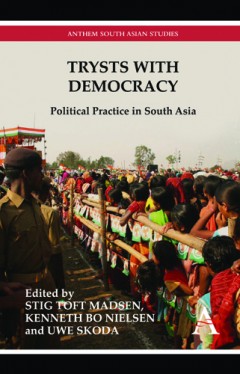Trysts with Democracy
Political Practice in South Asia
Edited by Stig Toft Madsen
Kenneth Bo Nielsen
Uwe Skoda
Other Formats Available:
- About This Book
- Reviews
- Author Information
- Series
- Table of Contents
- Links
- Podcasts
About This Book
This volume addresses the current configuration of democratic politics in South Asia from a cross-disciplinary perspective. The essays seek to examine the larger questions of how democratic values are embedded in social and political institutions, and how localised and everyday political values inform the multiple ways in which democracy is understood and practised. One of the strengths of this collection is the fact that it does not seek to provide answers to these questions from within one academic discipline only, but rather brings together scholars with backgrounds in a variety of social science disciplines and the humanities.
A number of allied questions and engaging debates emerge throughout the book. How may we distinguish between democracy’s formal and less-than-formal dimensions in the context of South Asia? How do notions of kinship, kingship and community tie in with larger processes of democratic politics and deepening political mobilisation? How do people construe the political in a context where the sphere of the religious seemingly seamlessly overlaps with the political, where the political cannot be separated from the social, and where the boundaries between state and society are blurred? How do people practically engage with the political and with democratic processes at a local level – and what might democracy mean in the vernacular?
Reviews
A number of chapters […] stand out for their ingenuity and interesting implications for the larger debate. […]The chapters in the second section on ‘India’ are all well-founded and shed light on different aspects of the political process and democratic practices […] All [the chapters] are well-written and provide interesting insights into selected political practices and processes.' –Marian Gallenkamp, 'Contemporary South Asia'
Author Information
Stig Toft Madsen has taught and researched in universities in Denmark and Sweden.
Kenneth Bo Nielsen is research fellow at the Centre for Development and the Environment, University of Oslo, Norway.
Uwe Skoda is assistant professor of South Asian studies at Aarhus University, Denmark.
Series
Anthem South Asian Studies
Diversity and Plurality in South Asia
Table of Contents
1. Introduction – Stig Toft Madsen, Kenneth Bo Nielsen and Uwe Skoda; 2. Why Did India Become a Democracy and Why Did It Remain Democratic? A Survey of the Literature and Some Comments to the Scholarly Debate – Jørgen Dige Pedersen; 3. Democracy in Bangladesh: A Village View – Arild Engelsen Ruud; 4. Ajit Singh s/o Charan Singh – Stig Toft Madsen; 5. A Princely Politician in an Indigenized Democracy: A Raja and His Electoral Situation in Rural Orissa 2004 – Uwe Skoda; 6. A Political Breakthrough for Irrigation Development: The Congress Assembly Campaign in Andhra Pradesh in 2003-2004 – Pamela Price; 7. Congress Factionalism Revisited: West Bengal – Kenneth Bo Nielsen; 8. Nepal: Governance and Democracy in a Frail State – Neil Webster; 9. Entanglement of Politics and Education in Sri Lanka – Birgitte Refslund Sørensen; 10. Shifting Between the Local and Transnational: Space, Power and Politics in War-Torn Sri Lanka – Cathrine Brun and Nicholas Van Hear; 11. Domestic Roots of Indian Foreign Policy – Walter Andersen; 12. Political Practice and Post-Islamism in Pakistan – Thomas Gugler
Links
Stay Updated
Information
Latest Tweets



